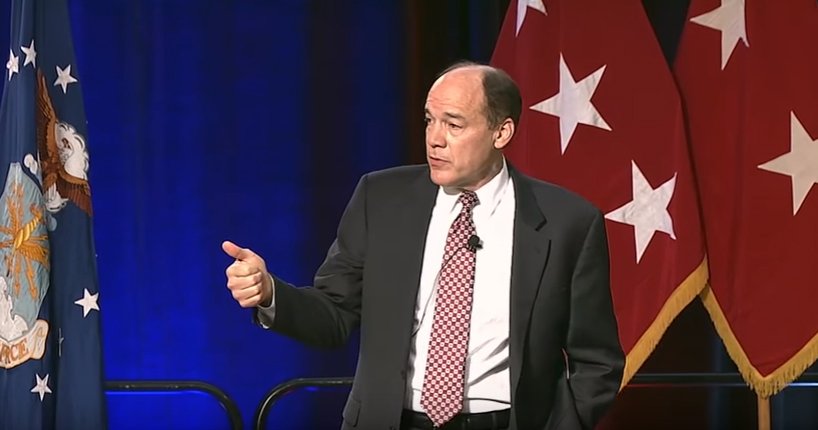

The Army has used authorities from Congress to pay bonuses to service members with specific cyber skills and it now is looking for ways to incentivize civilian...
Forget about all the talk about training and the mission when it comes hiring and retaining cyber expertise in the government.
Just look to the 1996 Tom Cruise and Cuba Gooding Jr. movie “Jerry McGuire,” and yell “Show me the money!”
The Army is taking a page right out of that script to offer service members and civilians bonuses to keep their skill sets in-house and away from the alluring private sector. And while it may be too early to say for sure it’s working, initial results are promising.
Ron Pontius, the deputy to the commanding general of the Army’s Cyber Command, said two years into the effort to pay service members who are cyber experts to stay has increased retention rates as compared to the service’s average.

“We have aligned our talent management and people strategy with the Army — acquire, develop, employ and retain. That is really what the focus is,” Pontius said at the AFCEA NOVA Army IT day on Jan. 21 in Falls Church, Virginia. “On the military side on acquire, we have a lot of ROTC and West Point cadets that want to be commissioned as a cyber officer, and we have many, many people knocking on recruiter’s doors wanting to be a cyber operator. There is not a lack of people who want to join us. So how do we look at the attributes based on what we’ve learned about who gets really good in this space and let’s be more discerning about who we commission and who we enlist to make sure we are getting what will turn out to be the best talent.”
Once the Army trains those experts, the concern is losing them to private sector jobs.
In 2017, Congress gave the Defense Department authority to offer skill incentive or bonus pay to try to stem the tide of service members leaving for higher paying jobs.
“For enlisted personnel, we have the Selected Reenlistment Bonus that focuses on junior grade personnel for retention. Cyber has the highest retention incentive across the Army; an eligible soldier can receive up to $82,000 for a six-year re-enlistment. We have paid over $1.4 million in SRB to retain our junior cyber soldiers,” Pontius said in email responses to questions. “For our senior non-commissioned officers, (NCOs0, we developed the enlisted Written Bonus Agreement in 2017. Eligible NCOs could receive up to $100,000 for a four-year service obligation, we have paid $3 million to 28 soldiers of the 32 that are eligible. These individuals typically have 20 years of experience; so for $3 million we retained a collective 560 years of experience for an additional 112 ‘employed-years.’”
In fiscal 2020, the Army introduced the Warrant Officer Retention Bonus (WORB) for cyber soldiers with specific technical capabilities.


For civilian employees, which, for example, make up 20% of the typical cyber mission force team, the Army has fewer retention options.
“We’ve had to do an engagement, a marketing effort with selected colleges and universities and we are building internships and fellowship programs to bring young men and women into our force,” Pontius said. “Can we truly compete with what they can get from industry for the high end operators on compensation? The answer is no. But what we can compete on is mission, serving the nation, teamwork and camaraderie. That is what we are really working on and trying to make sure that the compensation is the best that we can do it.”
Over the long term, the Army is considering recommending a proposal in the fiscal 2022 defense authorization bill to develop the cyber professional pay for both military and civilian personnel.
“This may require modification of 5 USC and 37 USC,” Pontius said. “We are also exploring a civilian equivalent of Assignment Incentive Pay (AIP) for that percentage of the workforce qualified within those critical work roles.”
Along with the Army, the Department of Homeland Security has found success in using bonuses to retain key cyber workers. In 2016, DHS began testing whether an additional 20% to 25% on top of an employee’s annual pay, depending on the certifications they’ve earned and the position they occupy, would keep them in government longer. This proof of concept is now part of DHS’ new personnel system that the agency is expected to finalize in early 2020.
As much as more pay is nice, the Army also is taking another potential obstacle to keeping civilian workers in their jobs longer. The Army created a path for civilian cyber workers, called Career Program 71, to help ensure they have the training and skill sets needed for today and the future.
Pontius said about 600 civilian employees are in CP 71 today.
“With a renewed, centralized focus on this newly defined community, CP 71 aims to bring equity across the Army cyber effects community for training, education and development opportunities, provide more employee and leadership engagement activities and a concentrated effort to identify and address any challenges that exist across the force, specific to this demographic,” Pontius said. “This new community mirrors the 17 series Army Cyber Branch for civilian training education and professional development of the non-military cyberspace operators who work alongside their soldier counterparts in this mission area. The CP 71 Career Program Office develops, empowers and advocates on behalf of the Army’s civilian cyberspace effects workforce. This includes affecting policy to sustain, retain, and employee engagement. The cyberspace effects career program provides a central hub of workforce coordination that trains, educates, and develops our globally-distributed team of professionals. The new program is anchored in a four-point training strategy which includes functional/technical training; self-development; academics; and broadening opportunities.”
In February, the CP 71 career program planning board will hold its first meeting to discuss strategic direction and needs as well as receive feedback from current CP 71 employees.
“A myriad of topics will be discussed, including workforce development, strategy and continued development of the program,” Pontius said.
Pontius added that the Army also is working with the Office of Personnel Management to address a special pay rate for cyber positions, particularly in Augusta, Georgia, the new home of the Army Cyber Command.
“We have programmed additional incentive funds to be used to provide equity in incentives for the cyber civilian workforce to address the gap,” he said.
Copyright © 2025 Federal News Network. All rights reserved. This website is not intended for users located within the European Economic Area.
Jason Miller is executive editor of Federal News Network and directs news coverage on the people, policy and programs of the federal government.
Follow @jmillerWFED
